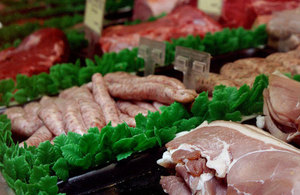Consumer confidence to be strengthened through new food crime unit
Government responds to Professor Chris Elliott's report into the food integrity and assurance of food supply networks

All of the recommendations in the Elliott report on food integrity and assurance of food supply networks have been accepted by the government, Environment Secretary Elizabeth Truss announced today.
This includes the establishment of a new Food Crime Unit, which the Environment Secretary said would strengthen consumer confidence in Britain’s high quality food.
British food has a world renowned reputation and the government wants to strengthen this to ensure families have confidence in the food that they buy. Shoppers should be able to understand where their food comes from and be protected from food fraudsters.
The new Food Crime Unit is one of a number of improvements the government is taking to ensure consumers have absolute confidence in the produce they purchase.
Professor Elliott’s review examines ways to prevent food fraud incidents from happening. It also looked into how to improve the culture of our food supply chain to support industry taking effective responsibility for the traceability of their products, support local authorities target enforcement activity based on risk and ensure consumers have an increased understanding of where their food comes from.
Speaking as the government published its full response to Professor Elliott’s report, Environment Secretary Elizabeth Truss said:
We’re taking action to make sure that families can have absolute confidence in the food that they buy. When a shopper picks something up from a supermarket shelf it should be exactly what it says on the label, and we’ll crack down on food fraudsters trying to con British consumers.
As well as keeping up confidence here, we need to protect the great reputation of our food abroad. We’ve been opening up even more export markets, which will grow our economy, provide jobs, and support the government’s long-term economic plan.
The action we’re taking gives more power to consumers - meaning they’ve got better labelling on food, better education about where their food comes from, and better, locally-sourced food in schools and hospitals.
The horsemeat fraud incident highlighted the importance of having transparency about the source of food products. Consumers made clear that they wanted assurance that what they are buying is what it says it is. Immediately after the incident consumers increasingly chose British food, with an increase of 10% in British beef on sale in UK retailers.
The government has taken further action to make sure consumers know where their food is coming from and ensure consumer confidence through:
- improved labelling including new country of origin labelling introduced from April 2015.
- making it easier for food procurers to make decisions about the locality, authenticity and traceability of their food.
The government has also taken action to empower consumers to understand where their food comes from through:
- improving public procurement of food and catering services to provide schools and hospitals with high quality British food and boost UK farming.
- improving food education in schools through a new national curriculum to give children a better understanding of where their food comes from and why it is important to know what is in our food.
Food and drink is our largest manufacturing industry and the integrity of the food supply chains is important for the credibility of our exports, our domestic economy and consumers. The government and industry have taken action to improve our reputation through:
- expanding trade internationally through the Export Action Plan, opening up new markets in China and the US and increasing exports of UK food and drink by 6.8% since 2010.
- robust testing of meat by industry and government with over 50,000 tests carried out - all of them showing that horsemeat was not present.
This demonstrates the effectiveness of the action taken to assure supply chains and protect consumers.
Notes
-
From September the government has now introduced a new curriculum to make food education compulsory for pupils aged 5-14 for the first time and teachers are required to cover nutrition, diet and where food comes from.
-
In July 2014, the government launched a new, simplified food and drink buying standard created by Dr Peter Bonfield, ‘The Plan for Public Procurement’, to introduce more locally produced food into schools, hospitals and canteens across the public sector.
-
Professor Elliott’s recommendations are;
-
giving top priority to the needs of consumers in relation to food safety and food crime prevention, including through targeted testing, intelligence gathering and surveys.
-
a zero tolerance approach to food fraud including by the development of whistleblowing and reporting of food crime.
-
a shared focus by government and industry on intelligence gathering and sharing.
-
improving laboratory testing capacity and capability to ensure a standardised approach for testing for food authenticity.
-
introducing new unannounced audit checks by the food industry to protect businesses and their customers.
-
government support for the integrity and assurance of food supply networks through the creation of a National Food Safety and Food Crime Committee.
-
leadership and coordination of effective investigations through the creation of a new Food Crime Unit.
-
ensuring mechanisms are in place for serious food safety and/or food crime incident management by implementing the recommendations of the Troop report